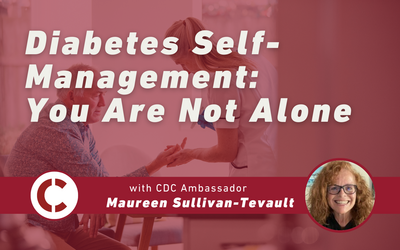
By CDC Ambassador Maureen Sullivan RN, CEN, CDCES
As a Registered Nurse and Certified Diabetes Care and Education Specialist, it deeply saddens me when I hear of someone with diabetes receiving minimal education (or worse yet, none) for their chronic medical condition. Without proper education, no one safely manages their health, much less achieve optimal wellness. Honestly, can persons with diabetes really be deemed “noncompliant” …. when they weren’t educated on how to properly manage their condition?
Diabetes can be an overwhelming chronic medical condition, even when everything is going right. From daily medications and injections, to counting carbs and calories, this condition can leave someone mentally drained at times, and that is when slip-ups happen.
As a Certified Emergency Nurse, I have worked in numerous Emergency Departments. I have cared for many critically ill patients, often due to complications that could have been easily averted with proper education. I am now excited to be part of the Chronic Disease Coalition, as an ambassador, and advocate for patients’ rights to access necessary disease specific education, affordable medication, and ongoing comprehensive medical care.
The DSMES, or Diabetes Self-Management Education and Support program, remains the gold standard for persons with diabetes. Its goal is to educate and empower a person to successfully manage their chronic medical condition. In doing so, the risks of long term, often life-threatening complications are minimized. This program should be offered at pivotal moments in a person’s lifetime:
At time of initial diagnosis
During medical care appointments
Anytime a health-related complication occurs
Whenever patients express concern over their health challenges
Many commercial insurance plans, as well as Medicare Part B and Medicaid, offer the following coverage:
10 hours of education for an initial diagnosis of diabetes
2 hours of follow-up training annually after initial training completion
The DSMES program includes the education:
Diabetes pathophysiology and treatment
Healthy eating to include meal planning, food label reading, carbohydrate counting, and strategies for eating out
Physical activity education related to better weight control, sleep habits and stress reduction
Medication administration, side effects, storage and cost issues
Blood glucose monitoring and equipment management
Prevention of complications
Healthy coping strategies
Sick day management to include intake/output monitoring, over the counter medication usage, carbohydrate counting, ketone assessment, fever control and when to seek emergency services
Problem solving, including emergencies (power outages, flooding, tornados, hurricanes)
People living with any chronic illness, including diabetes, have the right to education and resources to help them achieve their optimal health. They should also check out resources in their community, such as the local pharmacist, hospital community outreach programs, and senior centers. Many offer classes free of charge. Finally, touch base with the American Diabetes Association for information on nearby support groups. When it comes to chronic disease management, it is important to know that YOU ARE NOT ALONE.
Additional Resources
The following websites are provided to assist in accessing appropriate diabetes related information, including insulin coverage, food insecurities, food bank locations, and DSMES information:
The American Diabetes Association provides information on prediabetes, Type 1, and Type 2 diabetes, as well as gestational diabetes and DSMES. Included on their website are sections on medications, support groups, diet and activity, advocacy efforts, and prevention efforts.
The Juvenile Diabetes Research Foundation is a global organization for Type 1 diabetes mellitus. The site offers information on all things T1DM, including sections for those newly diagnosed, those interested in fundraising, research and clinical trials, daily diabetes management, volunteer opportunities, and access to local chapters worldwide. From the healthcare provider perspective, this website offers continuing education programs and pdf downloads for patient specific education.
The Get Insulin website provides information for persons with diabetes to access affordable insulin coverage. The site also offers information and guidance on health insurance plans, an insulin related newsletter, and external links to food sources (for patients with food insecurity issues).
The Feeding America website enables persons with food insecurities to access food banks in their area, according to state location and zip code.